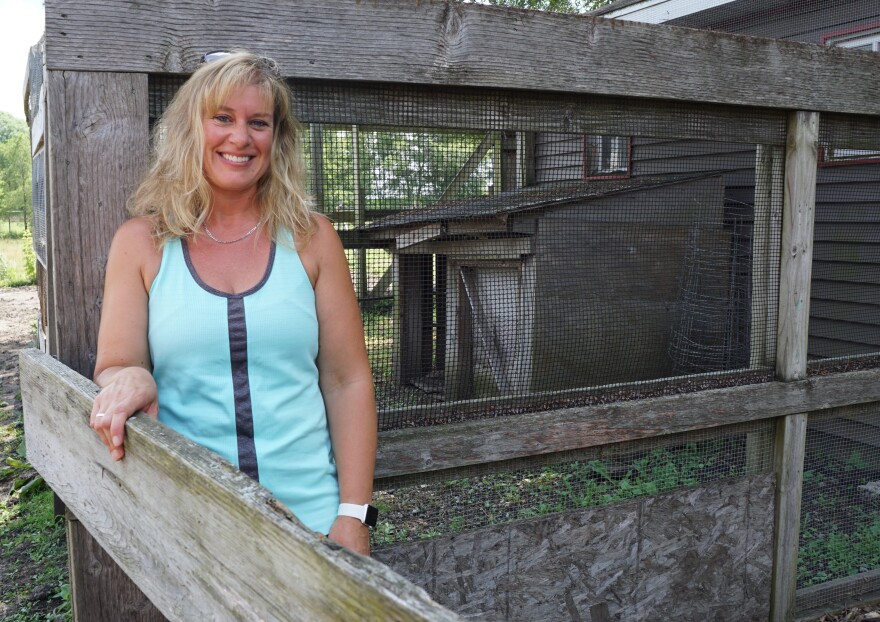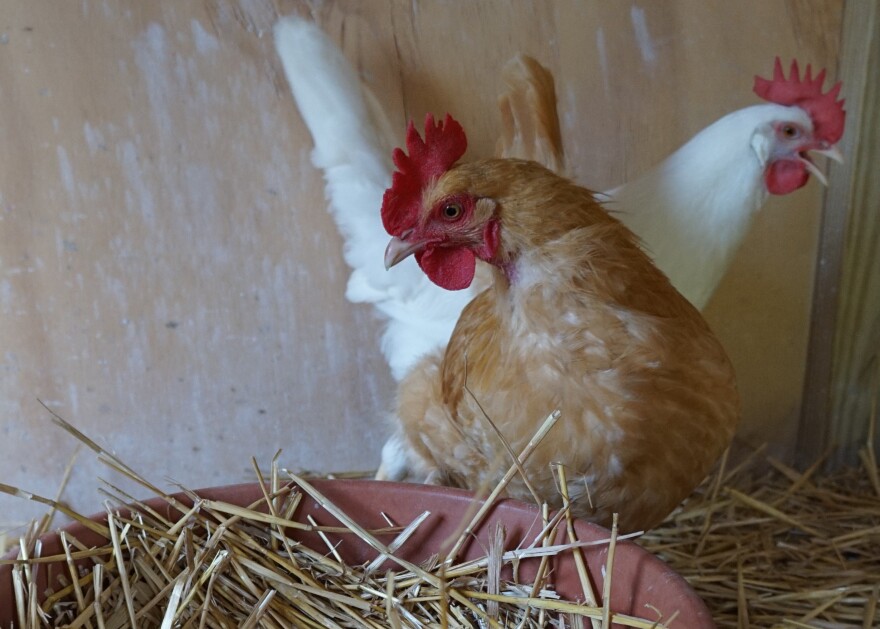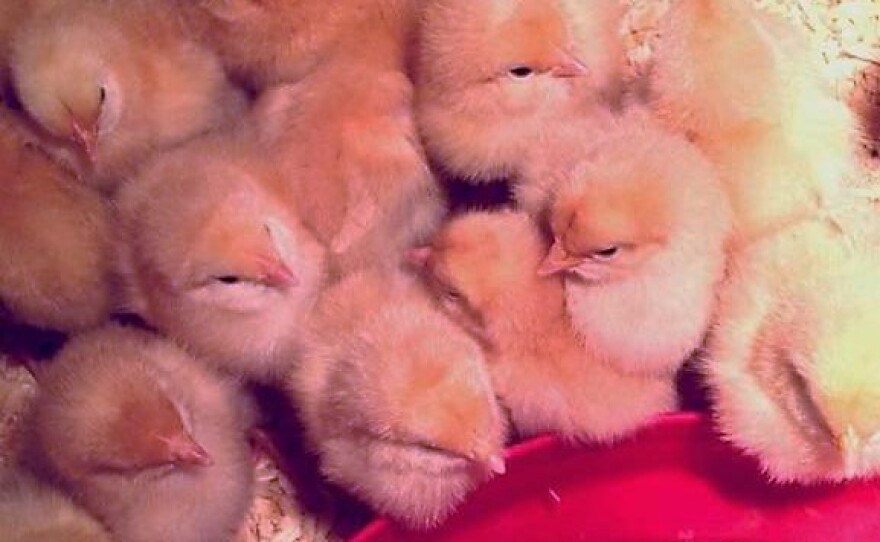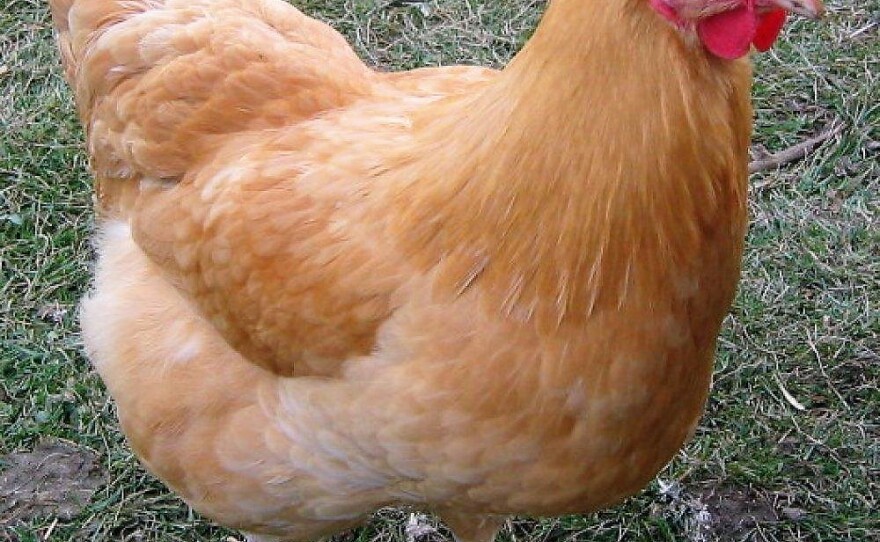Chicago has them. So does St. Charles. Even Naperville. Does your town allow backyard chickens?
DeKalb doesn’t, but a group of egg fans is eager to bring the issue up with the city council, where a backyard chicken proposal was rejected six years ago.

People want eggs – not alarm clocks. So roosters generally are not allowed in urban backyards. But even with roosters out of the picture, local governments are still wary about letting people put up a chicken coop in their backyard, no matter how cute the little shed is.
When DeKalb City Council shot down the idea of backyard chickens in 2012, objections included the smell, diseases, messes, and even appearing “too country” when trying to attract new businesses. But attitudes are changing about urban farming. Ken Koelkebeck, professor and University of Illinois Extension poultry specialist, says over the past decade, backyard chickens have gained popularity nationally, and a growing number of Illinois cities are allowing them.
The prospect has recent DeKalb High School graduate Justin Le excited. His interest in chickens grew out of a biology class where they raised a chick, as well as family visits to Vietnam, where he saw chickens as an important part of the culture. Now he sees how they could benefit his DeKalb neighborhood.
“There’s a garden in the entrance of my neighborhood that gives out a ton of food each year. The neighbors love it. We can do that with eggs.”
Le has started a Facebook page and group for backyard chicken supporters in DeKalb where he can share information with community.

It’s a sense of community that got Clare Kron into the urban chicken issue. She is the co-chair of DeKalb’s Citizens’ Environmental Commission and teaches environmental biology at Kishwaukee College. She says the DeKalb Sustainability Plan mandates more options for food security – and that means more fresh, local options. But as appealing as eggs from your own backyard may be, they aren’t free – or even cheap.
“We are going to have an issue with the amount of money it takes to buy chickens and set up housing,” said Kron. “And we wish to address the health issues of those with lower socioeconomic status. We have to look at organizations that may be able to provide community chicken coops.”
Kron says that’s one of many areas that need to be researched as DeKalb draws up a draft ordinance regarding chickens.

Matthew Fredrickson lives in Sycamore Township, in an older established neighborhood where people take good care of their lawns and their vegetable gardens. He highly recommends caring for a small flock of laying hens, like his family does. But he says by owning chickens, you are not going to save any money on your grocery bill. It’s like vegetable gardening: there are a lot of startup costs, not to mention the work.
Fredrickson’s children are ages 8, 6, and 4. He wants them to be able to learn the things he learned growing up on a Wisconsin dairy farm but in their own backyard. So they feed the chickens, help clean the coop, gather eggs, and learn responsibility. They’ve also learned an important lesson that clears up a popular myth about hens: “You don’t need a daddy chicken for the mommy chicken to lay eggs,” Fredrickson explained to his kids.

But Fredrickson has avoided one of the harsh realities of chicken life so far: what to do when they stop laying. Their six are only about a year old and have several years of egg-laying ahead of them. But then they stop. Then what? He says having a few chickens in an urban environment allows their personalities to come out and the family gets attached. Slaughtering the birds is no longer a very good option.
So Chickaletta, Ziti, Marsala, Patty, Nugget, and Noodle will probably live on as pets. Not dinner.
That’s one reason Brandy Overhaug doesn’t name her chickens. And housing 30 at a time doesn’t give her much room to grow attached. She says sometimes they die on their own: “By looking at them, you can tell they are tired and done. Their back end is deteriorating. After three or four years, they’re pretty tired. We typically give them to people who want to harvest and eat them.”
Like the Fredricksons, Overhaug saw raising chickens as a great opportunity for her children to learn responsibility. Part of that responsibility is an investment of time. Earlier this year, she realized her family had too many obligations to properly care for chickens. So her big 30-hen coop sits empty, ‘til next year. Overhaug says there are other dangers to watch for beyond the proverbial fox in the henhouse. Her neighbor’s dogs got into her coop and killed her whole flock. Coyotes and hawks are also eager to pick her birds off.

And the other big threat to your chicken’s health? Disease. That can be a challenge, according to poultry expert Ken Koelkebeck. He says “bio-security” is important: be aware that others who own chickens could spread disease between their flock and yours, which has happened recently in a big outbreak in California. Be smart and wash your hands frequently when around the birds.
And on behalf of the birds, Koelkebeck says rookie hen ranchers need to remember “FLAWS” if they want to raise healthy, even happy, chickens: Feed, Light, Air, Water, and Security.
Brandy Overhaug says all that work is worth it once you taste the fruit of your chicken’s labor. “If you are buying eggs every week at the grocery store, you should get some chickens,” she recommends. “It’s good for them and good for you.”
But is it good for your neighbors? DeKalb’s Citizens’ Environmental Commission is researching the subject, plans public hearings, and will report back to city council and the zoning board. Meanwhile, don’t count your chickens – the process is expected to take months.








